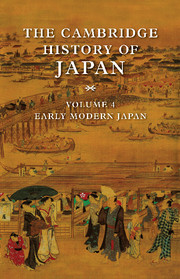Book contents
- Frontmatter
- 1 Introduction
- 2 The sixteenth-century unification
- 3 The social and economic consequences of unification
- 4 The bakuhan system
- 5 The han
- 6 The inseparable trinity: Japan's relations with China and Korea
- 7 Christianity and the daimyo
- 8 Thought and religion: 1550–1700
- 9 Politics in the eighteenth century
- 10 The village and agriculture during the Edo period
- 11 Commercial change and urban growth in early modern Japan
- 12 History and nature in eighteenth-century Tokugawa thought
- 13 Tokugawa society: material culture, standard of living, and life-styles
- 14 Popular culture
- Works Cited
- Index
- Provinces and regions of early modern Japan
- References
10 - The village and agriculture during the Edo period
Published online by Cambridge University Press: 28 March 2008
- Frontmatter
- 1 Introduction
- 2 The sixteenth-century unification
- 3 The social and economic consequences of unification
- 4 The bakuhan system
- 5 The han
- 6 The inseparable trinity: Japan's relations with China and Korea
- 7 Christianity and the daimyo
- 8 Thought and religion: 1550–1700
- 9 Politics in the eighteenth century
- 10 The village and agriculture during the Edo period
- 11 Commercial change and urban growth in early modern Japan
- 12 History and nature in eighteenth-century Tokugawa thought
- 13 Tokugawa society: material culture, standard of living, and life-styles
- 14 Popular culture
- Works Cited
- Index
- Provinces and regions of early modern Japan
- References
Summary
THE SENGOKU VILLAGE LEGACY
Near the end of the Tokugawa period, officials from the shogunate's Finance Office undertook a survey of villages in Musashi and Sagami provinces. During the course of their investigations, the bakufu officials consulted documents preserved by prominent village families that traced their lineages back in time to samurai society of the sixteenth century. Some of the documents from the villages of Sagami had been issued by the Hōjō house of Odawara, and many of the Musashi documents carried the seal of the Uesugi daimyo. Among them were directives requiring the recipient to provide horses for military service, whereas others bestowed fiefs in reward for distinguished service in battle, an indication that some of the villagers' ancestors had served, nearly three centuries earlier, as warriors under the Sengoku daimyo. Other evidence corroborates this notion. In many cadastral survey registers from the early seventeenth century, it is not uncommon to find two persons listed as cultivators (sakunin). Usually the name of a samurai or priest appears first, below which is entered the name of the man who was presumably the actual cultivator, separated by the term bun. From this it is clear that many former samurai who had lived in the villages while serving the Sengoku daimyo as warriors remained on the land in the seventeenth century, thus establishing the lineages revealed in the survey at the end of the Edo period.
- Type
- Chapter
- Information
- The Cambridge History of Japan , pp. 478 - 518Publisher: Cambridge University PressPrint publication year: 1991
References
- 5
- Cited by

